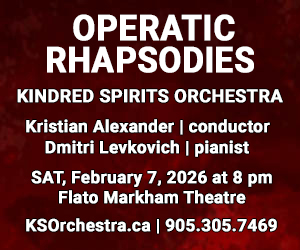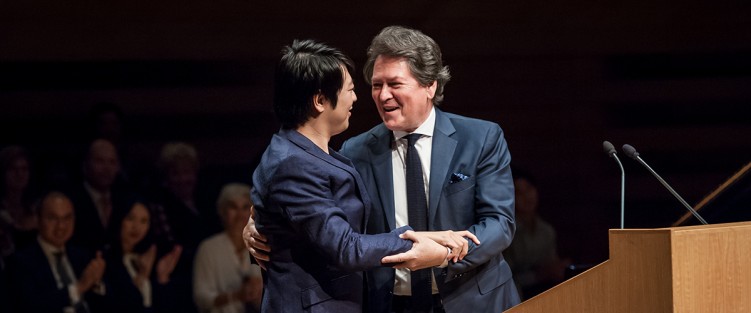 The sound of trumpets bookended a wonderful Koerner Hall May 23 evening that balanced solemnity, joyful retrospect, and reflections on a professional life well lived. The occasion: the retirement of Dr. Peter Simon following an extraordinary career as President & CEO of The Royal Conservatory of Music.
The sound of trumpets bookended a wonderful Koerner Hall May 23 evening that balanced solemnity, joyful retrospect, and reflections on a professional life well lived. The occasion: the retirement of Dr. Peter Simon following an extraordinary career as President & CEO of The Royal Conservatory of Music.
First it was Hail to the Chief, as played solo by Andrew McCandless, principal trumpeter of the Toronto Symphony Orchestra. Here, the dynamic range and clarion call-like melody of James Sanderson’s 1812 regal composition (most frequently performed at Presidential Inaugurations) managed to set an appropriate tone of reverence for the celebrant, but also imbued a “tongue in cheek” playfulness to the musical proceedings that would carry through the evening.
A few hours and several extraordinary performances, speeches, videos and former Prime Ministerial acknowledgments later, it was Jens Lindemann’s turn, accompanied by Robi Botos; the trumpet/piano duo capped off the evening with a poignant rendition of Oscar Peterson’s great composition, Hymn to Freedom.
As the final held notes faded in the gorgeous acoustic hall that Simon envisioned, fundraised for and successfully willed to fruition, the musical portion of the evening felt appropriately conclusive, while still holding out a world of possibility. For a man who shaped the RCM around “a deeply held and profound belief that the arts are the most powerful means through which you can develop individual lives and, by extension, build a more cohesive society,” as he told the WholeNote earlier this month, it was a fitting finale – a profound musical statement honouring someone who has used the arts to develop both his own life and that of others, and who has left this city’s musical community and landscape more cohesive and robust than how he found it some 33 years earlier.
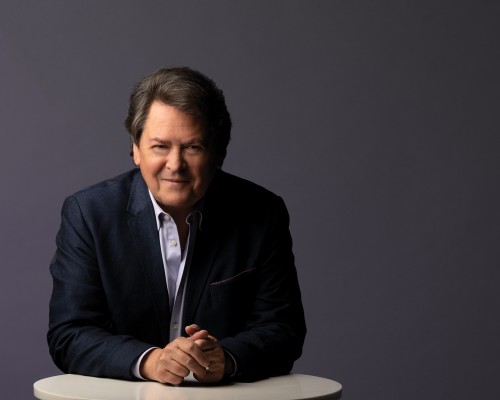 Born in Hungary in 1949, Simon and family fled the country following the 1956 Hungarian revolution, temporarily finding safety in an Austrian refugee camp before coming to Canada in 1957. Soon, Simon began studying at Toronto’s Royal Conservatory of Music with famed pedagogue and composer Boris Berlin, whose “ABC” educational books on piano fundamentals have moulded millions of young musical minds worldwide. For Simon, this early instruction was a twofold formative experience.
Born in Hungary in 1949, Simon and family fled the country following the 1956 Hungarian revolution, temporarily finding safety in an Austrian refugee camp before coming to Canada in 1957. Soon, Simon began studying at Toronto’s Royal Conservatory of Music with famed pedagogue and composer Boris Berlin, whose “ABC” educational books on piano fundamentals have moulded millions of young musical minds worldwide. For Simon, this early instruction was a twofold formative experience.
First, it offered a point of entry into a world of classical music studies: Simon would first go on to the Juilliard School, then ultimately earn his doctorate in piano performance at the University of Michigan under the tutelage of Leon Fleisher. But perhaps more profoundly, he would have learned that musical ideas could have a global impact. Years later, on taking the reins of the RCM institution as President and CEO on September 1, 1991 Simon quickly began to work on this: continuing to underscore the importance of the conservatory locally and provincially, while at the same time fostering nationals and international connections.
Speaking about the RCM of 2024, Simon states, “You have to remember that more than half the people who are working inside the walls [of the RCM] are working on programs for people outside of the walls. We’re designing curriculum, creating individual programs, operating the examinations and creating the publishing. We work with 30,000 teachers across Canada and the US, and there has to be a place where these ideas and networks are created. The people in our building drive national and international connections.”
One got a sense during the Thursday night celebratory event of the national and international connections that have been forged and conversations that have been advanced at and by the RCM. There was a bounty of video testimonials from around the globe about the profound impact that both Simon and the RCM have had internationally, underscored by a brilliant first-half performance by the Royal Conservatory Orchestra, fresh off their Carnegie Hall debut, demonstrating aptly why this RCM flagship ensemble has become a feeder group for many of the greatest orchestras around the world.
A difference of kind
In his earlier conversation with The WholeNote, Simon was asked to comment on whether his vision for the RCM, as well as its Glenn Gould School training programs, had suffered in the past because as a conservatory it was not a degree-granting institution. “The development of a gifted musician requires a profound and fundamentally different approach than the kind of structures one would find in a university,” was his reply. “It is far more personal and is very much oriented to [a relationship with] the instrumental teacher. The support that students need is personal [from] someone who knows and understands them. You are really nurturing somebody. Not educating, but nurturing. What is needed is mentorship as opposed to instruction.”
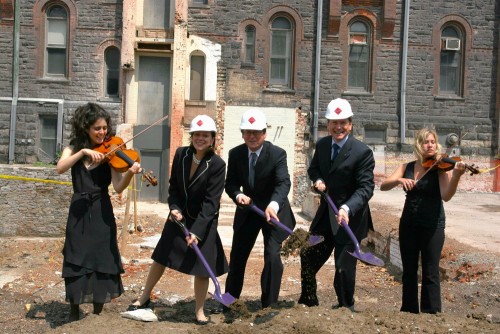 Daisy-chaining these philosophical ideas together underscores the RCM’s mentorship-based “culture of support”. Nowhere was this more in evidence than in the symbiotic relationship of pedagogy and architecture which led, in 2009, to the opening of Koerner Hall, housed in the TELUS Centre for Performance and Learning. Understanding that masterclasses – the opportunity for Gould and RCM students to have valuable facetime and instruction from world-class musicians – was a crucial component of the RCM’s pedagogical model, the creation of Koerner Hall, and subsequent world-class concert programming by Executive Director Mervon Mehta, created opportunities for students to learn from the finest visiting artists, as well as offering rich listening opportunities for Toronto audiences.
Daisy-chaining these philosophical ideas together underscores the RCM’s mentorship-based “culture of support”. Nowhere was this more in evidence than in the symbiotic relationship of pedagogy and architecture which led, in 2009, to the opening of Koerner Hall, housed in the TELUS Centre for Performance and Learning. Understanding that masterclasses – the opportunity for Gould and RCM students to have valuable facetime and instruction from world-class musicians – was a crucial component of the RCM’s pedagogical model, the creation of Koerner Hall, and subsequent world-class concert programming by Executive Director Mervon Mehta, created opportunities for students to learn from the finest visiting artists, as well as offering rich listening opportunities for Toronto audiences.
“We probably do more here in terms of master classes because it is important for students to have contact with international artists and Koerner Hall affords us that opportunity,” Simon says. [Masterclasses] give you a very clear perspective of where you are in relation to the career that you seek. There are no illusions. When a student hears [American classical pianist and 2013 MacArthur “genius” grant recipient] Jeremy Denk playing and then giving a lesson, it becomes clear that Denk is an incredible pianist and musician, and that’s the standard.”
Excellence and transformation
Many musical standard bearers attended the May 23 event. Just as geography was traversed in terms of international acknowledgments and well wishes, the musical styles on display were a deftly negotiated journey. Music most often classified under the wide umbrella term of “classical” was principally featured (including fine video performances by Simon’s wife, Dianne Werner, as well as Simon himself). But jazz was admirably represented as well by a solo performance of George and Ira Gershwin’s warhorse I Got Rhythm, in solo piano form, by the aforementioned Botos (the RCM’s inaugural Jazz Artist-in-Residence). Further, with a nod to Duke Ellington’s famous 1962 aphorism that there are only two kinds of music (“good music and the other kind,”) the always wonderful mélange of sounds, inspiration and traditions that is the unclassifiable Art of Time Ensemble backed up former Barenaked Ladies front person Steven Page (singing the Beatles, no less) demonstrating that the only constant in the evening’s programming was musical excellence.
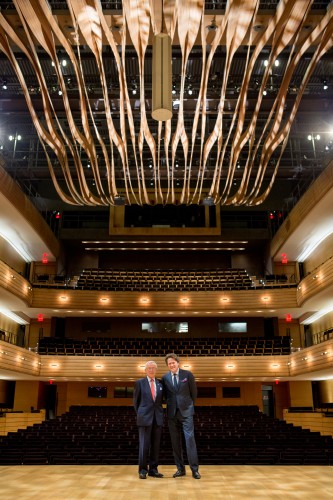 This is not surprising. Musical excellence, rather than hewing to an orthodoxy of style, has long been a central tenet of the RCM, the Glenn Gould and the Oscar Peterson School of Music, as well as the musical offerings presented at Koerner. This is not happenstance. After assuming the leadership at the RCM, Simon strove to “bring the conservatory to an international level, respected in every way, and to have the kind of structure that is both unique, but appropriate for a conservatory within a society. Canada needed a school at the highest level internationally so that people did not automatically go off to Juilliard or somewhere else. We have that now.”
This is not surprising. Musical excellence, rather than hewing to an orthodoxy of style, has long been a central tenet of the RCM, the Glenn Gould and the Oscar Peterson School of Music, as well as the musical offerings presented at Koerner. This is not happenstance. After assuming the leadership at the RCM, Simon strove to “bring the conservatory to an international level, respected in every way, and to have the kind of structure that is both unique, but appropriate for a conservatory within a society. Canada needed a school at the highest level internationally so that people did not automatically go off to Juilliard or somewhere else. We have that now.”
Such bullish declarations of ambition and open acknowledgments of meritocratic excellence feel somehow out of date today. But Simon makes no apologies. By brazenly celebrating excellence, trumpeting the RCM’s gilded legacy, and putting supreme talent on a magnificent stage, the RCM that Simon built continues to show the potential of human accomplishment.
“There is the social aspect as well,” Simon continues. “The study of music is really important to society. It’s music that connects people. It’s music that in the end, especially with young children, is transformational for developing an emotional life psyche and the emotional awareness that is so important as we go forward and [try to] understand others.”
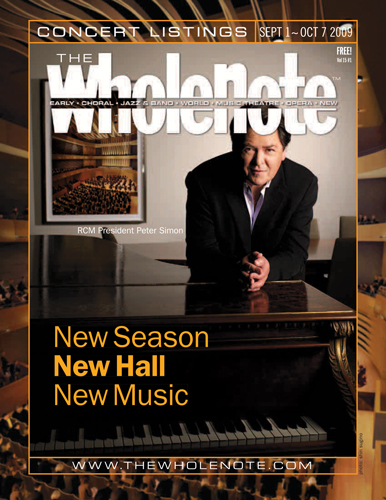 Acknowledging, as the evening’s master of ceremonies Denise Donlon did so eloquently, that the need to understand others within our broader society feels perhaps more urgent now than at any time before, the diversity of the evening’s music, participants and offerings offered up a hopeful beacon of societal possibility. And as the post-concert crowd retired to Koerner Hall’s glass-enclosed second floor lobby bar for good cheer and the musical offerings of guitarist Michael Occhipinti and his terrific group, the unifying and efficacious results of Simon’s articulated values and vision were on full display.
Acknowledging, as the evening’s master of ceremonies Denise Donlon did so eloquently, that the need to understand others within our broader society feels perhaps more urgent now than at any time before, the diversity of the evening’s music, participants and offerings offered up a hopeful beacon of societal possibility. And as the post-concert crowd retired to Koerner Hall’s glass-enclosed second floor lobby bar for good cheer and the musical offerings of guitarist Michael Occhipinti and his terrific group, the unifying and efficacious results of Simon’s articulated values and vision were on full display.
“It comes down to will. I am 100% for music and for the arts, the thirst for excellence in that [domain] and my belief in its power. On this I will rarely, if ever, compromise in any way. In terms of programming philosophy, there is always a balance of things that is required, of course, but excellence is always number one. Because otherwise…why?”
Important final words indeed. Not only in relation to the May 23 event, but for the RCM that, starting in September, must continue under the leadership of Simon’s successor Alexander Brose (who on the night proved himself, in equal parts, both a capable singer and potentially charismatic fundraiser, with On the Street Where You Give – a craftily manipulated version of Lerner and Loewe’s timeless lyric) to reach out to the larger society that exists beyond the confines of the RCM’s hallowed and historic Bloor Street walls.
Andrew Scott is a Toronto-based jazz guitarist (occasional pianist/singer) and professor at Humber College, who contributes regularly to The WholeNote’s DISCoveries record reviews.



